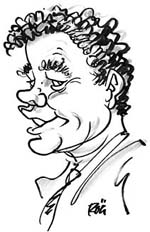|
 Contents
Contents
 Next Article
Next Article
VC's voice
 Sussex has done very well in the 2001
Research Assessment Exercise (RAE). The proportion of staff in 5-rated groups
has risen from 52% to 65% and all submissions were rated 4 or higher, so
meeting the two main goals we had set ourselves. We submitted a high proportion
(91% of eligible staff) and had all submissions rated excellent by national or
international standards. This is a tribute to the all-round strength of
research at Sussex. Sussex has done very well in the 2001
Research Assessment Exercise (RAE). The proportion of staff in 5-rated groups
has risen from 52% to 65% and all submissions were rated 4 or higher, so
meeting the two main goals we had set ourselves. We submitted a high proportion
(91% of eligible staff) and had all submissions rated excellent by national or
international standards. This is a tribute to the all-round strength of
research at Sussex.
We should take particular pleasure in those
groups - Physics, Psychology and Statistics - that moved up by two grades
between 1996 and 2001, and in the achievement of a 5 rating for the first time
by Anthropology, Applied Mathematics, Education, Engineering, Music and
Philosophy.
This is an impressive performance, but the
performance of many other universities has been even more impressive.
Nationally, the proportion of staff in units rated 5 or 5* has risen from 31%
to 57%, and the proportion of staff in 5* rated units is now 19%. We have not
kept pace with the overall improvement in grades, and the fact that we do not
have any 5* grades is the most striking respect in which we have not kept pace
with the competition.
There has been some discussion about
whether the increase in national performance is 'grade inflation' and whether
therefore the RAE has reached the end of its useful life. I think the increase
in grades largely reflects a genuine improvement in the production of
high-quality research, that the dual-support system of research funding (with
funding coming both from the funding council and the research councils) should
continue, and that some form of RAE will therefore continue. We should plan on
the basis that it will.
If the University aims to remain a leading
research institution, and I think we should, we then have to accept the
implications for the way we manage ourselves. We will have to be more strategic
in the allocation of resources and we will have to manage research more
actively than we have done in the past. The new School structures will provide
a better framework for appraisal, staff development and performance management,
in which academic staff, especially young faculty, will have a clear sense of
what is expected of them and to whom they are responsible for the meeting of
these expectations. I know that some regard 'managerialism' as a dirty word,
but I strongly believe that such an approach can be supportive rather than
threatening.
There will be difficult financial
consequences of the RAE outcome. The funding council is unable to fund grades
at current rates, and has announced that only 5*-rated groups will be protected
from the funding shortfall. This is bad news for Sussex and we are likely to
lose over £1m of grant annually. We are already running a deficit on current
activities of over £0.3m, and we need financial headroom of at least £1m
annually to make selective investments, particularly in new faculty and
facilities. These three sums together imply that we have to contemplate a very
painful reduction of around £3m annually in the resourcing of many current
activities over the next 12 months if the University is to remain competitive.
But to repeat the positive message: an RAE
outcome in which all research at Sussex was judged excellent is a very strong
foundation on which to build for the future.
 Contents
Contents
 Next Article
Next Article
Friday 11 January 2002
Publication Details
Page Created By: USIS
On behalf of: The Press and Communications Office, Sussex House, ext 8609/8209
Email: internalcomms@sussex.ac.uk
|